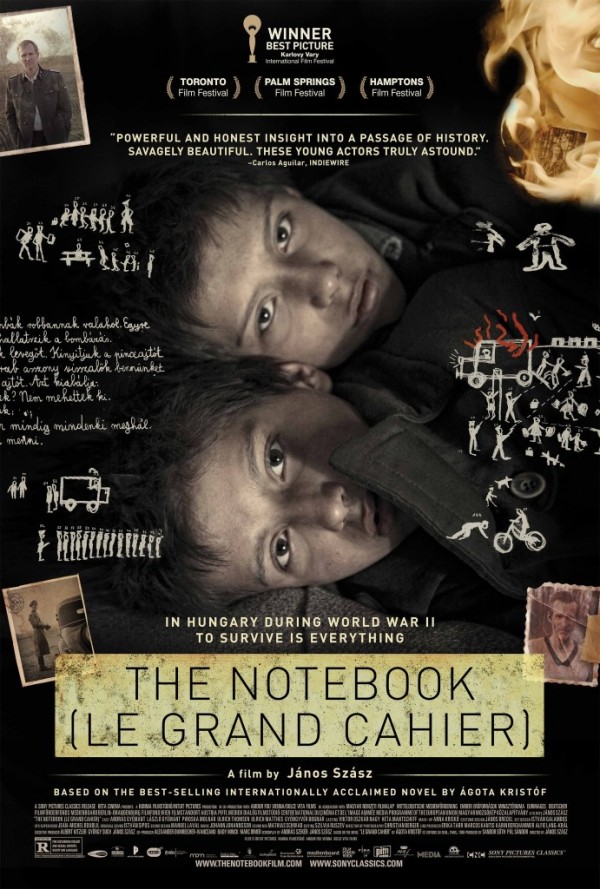THE NOTEBOOK (1913, directed by János Szász, 109 minutes, Hungary)
 BY DAN BUSKIRK FILM CRITIC When I first saw the title The Notebook on the new release roster I thought, “Oh boy, a ten year anniversary re-release of the Ryan Gosling weeper?” Nope. This Hungarian import, the country’s submission for last year’s “Best Foreign Film” Oscar, couldn’t be further away from that romantic crowd-pleaser. Set in the Hungary at the end of WW II, the slow-building thriller is a pitch black tale of twin boys learning of life’s dark side as the madness of war sweeps through the countryside. The Notebook tells the story of how war shapes a society, not just in the visible ways but invisibly in the psyches of the children who witness it.
BY DAN BUSKIRK FILM CRITIC When I first saw the title The Notebook on the new release roster I thought, “Oh boy, a ten year anniversary re-release of the Ryan Gosling weeper?” Nope. This Hungarian import, the country’s submission for last year’s “Best Foreign Film” Oscar, couldn’t be further away from that romantic crowd-pleaser. Set in the Hungary at the end of WW II, the slow-building thriller is a pitch black tale of twin boys learning of life’s dark side as the madness of war sweeps through the countryside. The Notebook tells the story of how war shapes a society, not just in the visible ways but invisibly in the psyches of the children who witness it.
John Boorman’s 1987 film Hope & Glory had a similar premise, showing how a boy witnessed WW II as a liberated landscape in which war allowed British children to run free while their parents sweat the big stuff. Director János Szász (working from a script adapted from Agota Kristof’s 1987 novel) sees the war’s effect differently. Here a pair of thirteen year-old twins (played by real-life twins László & András Gyémánt) are left to their own devices to absorb the moral ambiguity of cataclysm. Left to live on a small farm with their cruel and maybe murderous maternal grandmother, the twins discover that there is no one to notice if they slowly and methodically strip themselves of all human compassion.
The film’s press stresses the fact that The Notebook was shot by Christian Berger, director Michael (Cache) Haneke’s favored cameraman, and the connection to Haneke’s beautiful and bleak cinema is worth noting (particularly Haneke’s recent film The White Ribbon, which also featured murderous youth). The twins’ descent is unleavened by humor as they discover the rural society’s various cruelties, dished out by the clergy, the nearby German troops and their own pitiless grandmother. In fact, one of the film’s only moments of glee comes from the cackling crowd who gathers to watch the town’s Jewish population hauled off to certain death. The twins, who only talk amongst themselves, view this all with wide eyes as a lesson on how the world works. The copy these lessons down in the notebook their father gave them as a journal and they fill it with stark illustrations that look as though they were scrawled in an asylum, a fitting depiction of how Europe truly was at the war’s end.
As morbid events pile up (a tortured wild girl with a cleft palette, pederasty, dead animals) the film takes on a sadistic edge that seemed to overwhelm the patience of much of the audience. Was there a point to the emotional battering The Notebook dishes out? The film plays its hand in the final act, as the boys finally cut the ties that connect them, emotionally and physically, to the world around them. From there the film leaves the pair to wander into the sunset, perhaps surviving a war but also keeping the war’s madness quietly living inside them. The Notebook may be a bruising, profoundly disturbing experience but its earns its power with a warning that the war never ends in those who witness its ugly fury.

